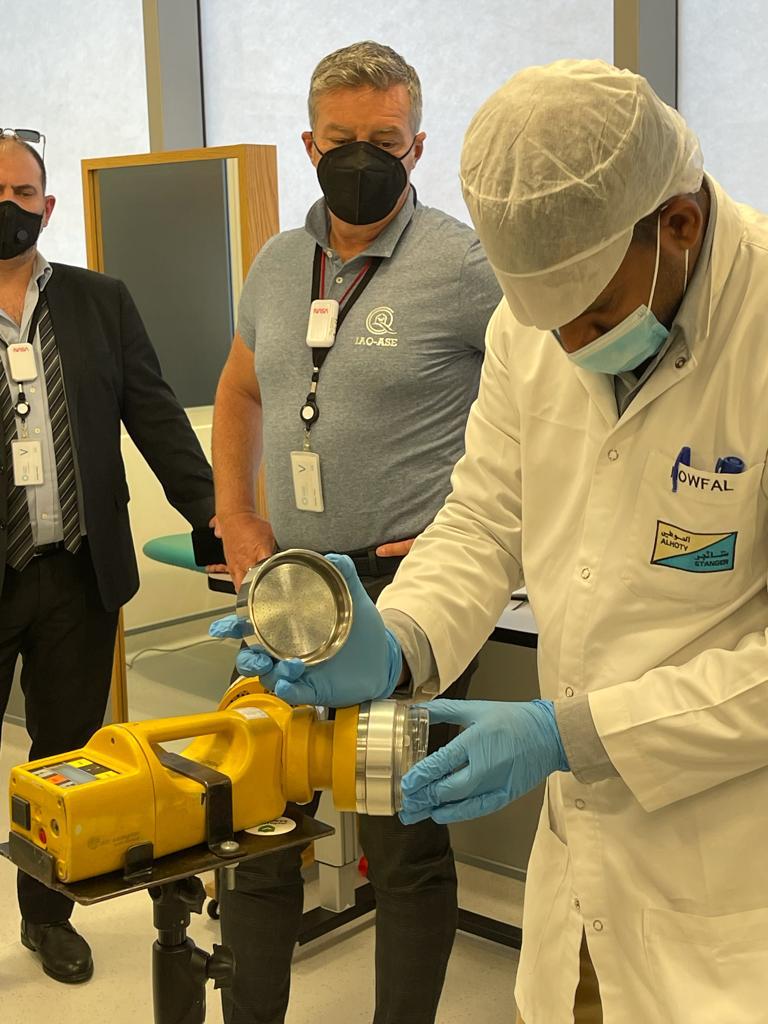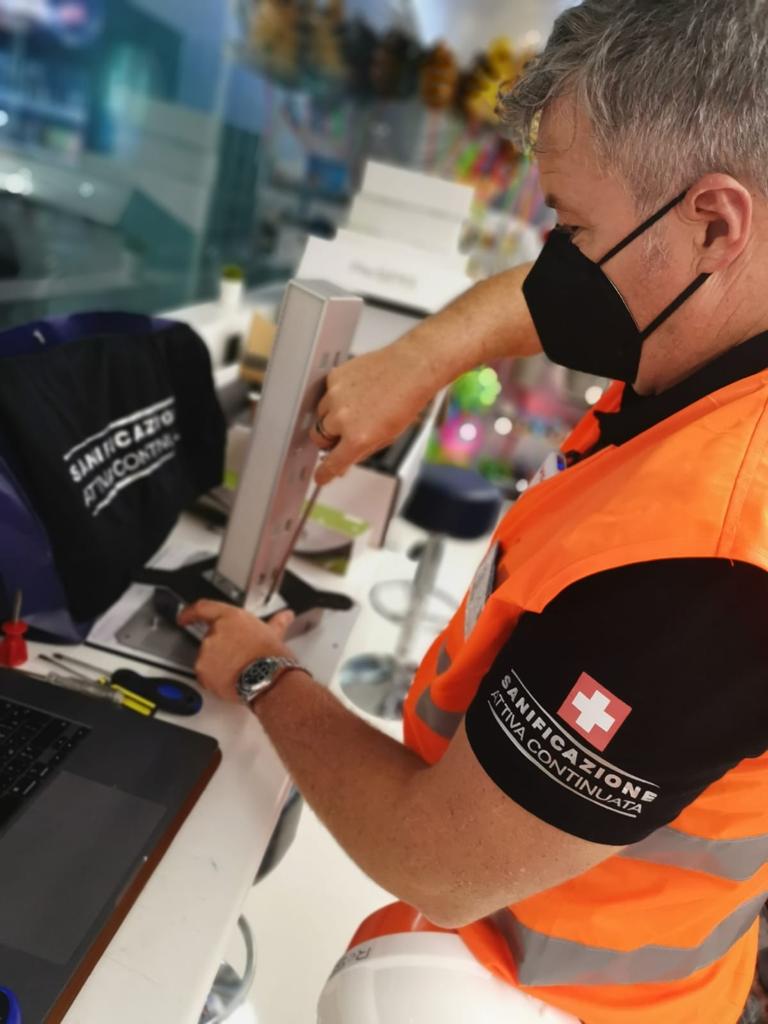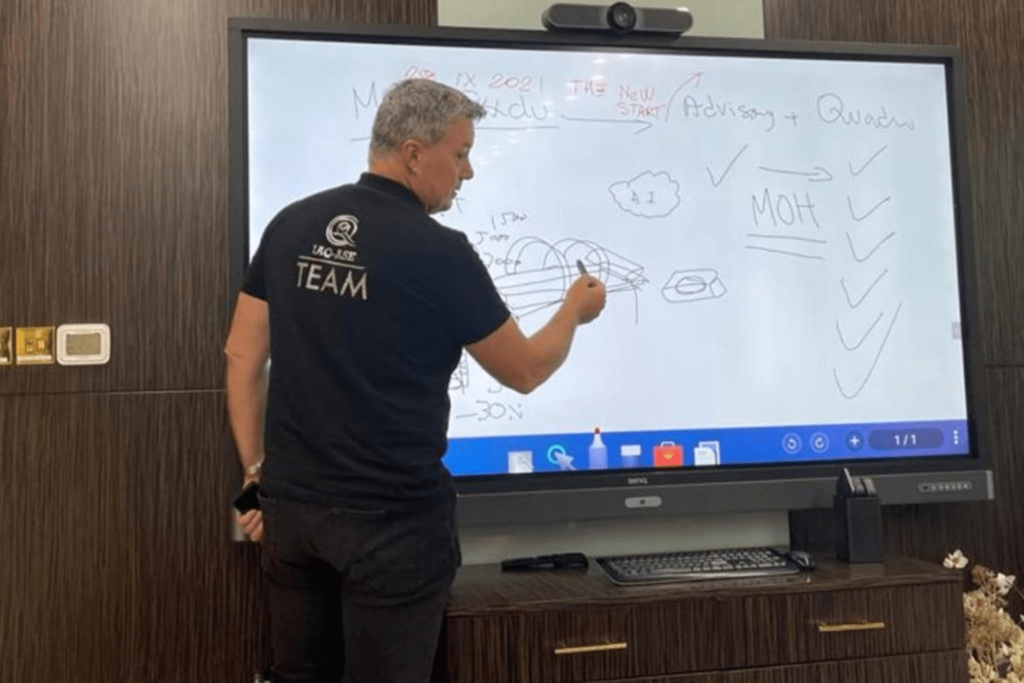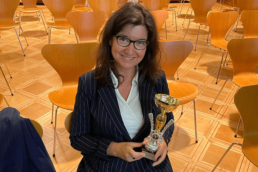Elisa Fanton: “By sanitizing the air, almost no contagion!”
Discovering IAQ-ASE, an award-winning company from Ticino that certifies the sanitization of indoor spaces, in the words of the chief engineer
By sanitizing indoor air, the risk of Coronavirus infection is reduced. The stale air of crowded rooms, such as buses, offices or classrooms, is loaded with bacteria, viruses, pathogens and chemicals.
Today, everyone knows to drink drinking water because dirty puddle water is a vehicle for disease, but the same awareness does not yet exist for air. Who would ever drink rainwater collected from sidewalks?
Breathing dirty air shared by dozens of other people, in pandemic times, is not so different. In fact, most places, from shopping malls to schools, from churches to transportation vehicles, do not have an air sanitation system.
Alessandro Bertoldi: “Before you ask, you must give!”
Enclosed places containing dirty air are deadly spots for spreading the virus. As research by the Canton of Graubünden in collaboration with ENPA has shown, cases of coronavirus infection are directly linked to air quality.
The head of the Cantonal Conduct Staff, Martin Bühler, in a December 14 interview with RSI reiterated this concept and explained that contagions in children’s classrooms occur mainly in classrooms where the air has a dirtiness index of more than 1500 parts per million.
Before imposing masks in elementary schools or vaccines to children should be equipped with all closed public environments of a system of air sanitation.
This is explained by Elisa Fanton, entrepreneur and engineer at the head of IAQ-ASE, a company based in Chiasso, Ticino, which certifies the sanitization of indoor spaces: with a degree in Civil Engineering from the University of Padua in 1989, she has been working in the field of sanitization for two decades and is the right person to explain to us what air purification can do in the fight against the pandemic.
Andrea Trevisan: “I’d like our technology to be used by everyone”

Tell us briefly what your company is all about….
“IAQ-ASE is dedicated to the training of professionals specialized in Continuous Active Sanitation, in the certification of their work and the results obtained as a result of the application of the technical specification: its mission is to improve the quality of life of people by allowing them to breathe healthy air. Some particular environments, such as hospitals, doctors’ offices, factories or laboratories, regardless of the pandemic, need healthy air. Currently, given the pandemic situation, the need for well-ventilated rooms has extended to all areas of life, from home to office, from buses to restaurants. Breathing healthy air, rather than stale air, saturated with carbon dioxide exhaled by strangers, mold, pathogens or chemicals, such as formaldehyde and ozone, has a big impact on quality of life.”
What kind of technology is envisaged by your specifications?
“We certify, through the application of the technical specification of Continuous Active Sanitization validated by Bureau Veritas, the effectiveness of a particular technology, which is based on heterogeneous photocatalysis. This technology has existed for over 25 years and has evolved over time: initially it was applied to water, which is a fluid, just like air. The results against pathogens of this technology are exceptional, and the most interesting thing is that it derives from a natural principle that was later engineered and industrialized.”
Monica Bravi: “I dream of becoming a serial entrepreneur”
Are there many ways to sanitize room air?
“There are mainly two ways, one passive and one active. The passive way of purifying the air, quite simply, works through the forced passage of air through a filter or near a germicidal lamp that, yes, “cleans” the air, but not permanently because the air, moving, mixes again with the stale air. The active mode, which is the one adopted by our specification, uses the air itself and its motion as a means to sanitize the indoor air and surfaces in the presence of people”.
Are there many companies active in this very important sector?
“With the arrival of the pandemic many companies have tried to address the market in this complex area, but few have really been able to deliver proven results. We have a long experience behind us.”
Leo Isolani: “In Switzerland, we do value work”

Tell us about your activity?
“Investing in air sanitization is equivalent to improving the quality of life and well-being of people: managers should provide as much as possible to sanitize the air of closed environments to limit contact with pathogens. The Canton of Ticino, for example, has spent a considerable amount of money giving masks to school children. With the same amount of money it could have invested in installing adequate air sanitation systems in schools. The costs are reasonable and their maintenance is inexpensive. To stem the spread of the virus, air sanitization systems are very efficient, and certainly more ecological and durable than disposable masks”.
Do you think it would be better if the law advised or incentivized facilities to equip themselves with an adequate air sanitizing system?
“Undoubtedly yes, infections would drop dramatically, as scientific research just demonstrated in the Canton of Graubünden. In the past, people drank unsanitized, i.e. undrinkable, water and died of cholera. Today people breathe unsanitized air and get sick. In Italy, the Marche Region, fortunately, has just made a public announcement to equip itself with controlled mechanical ventilation devices combined with air sanitization systems in schools”.
Eleonora Bafunno: “The ‘democratic’ piano is a reality”
How effective is the Continuous Active Sanitation specification?
“The presence of microbiological pathogens drops by up to 99 percent if our methodology is correctly applied, allowing you to acquire IAQ-ASE certification. This is confirmed by tests carried out by laboratories accredited and validated by Bureau Veritas, the oldest and most prestigious certification body in the world.”
How do you see the evolution of the market in which you operate and the relationships with competitors?
“Sanitization is the challenge for our future and must be a matter for experts in the field: only in this way will it be possible to resolve all the confusion around this issue; it must be able to take into account new technologies and integrated studies of engineering, medicine and biology. There is also a lot to be done for the detection of chemical-physical and microbiological pollution data in the environment according to the intended use of the environments and their crowding rate, to implement risk prediction models”.
Valeria Cattaneo: “Me in Lugano? A… marble dreamer!”







